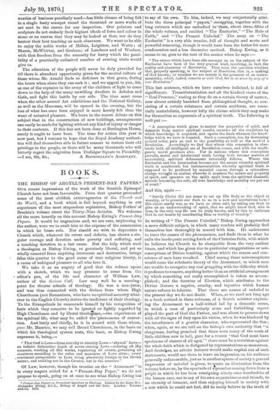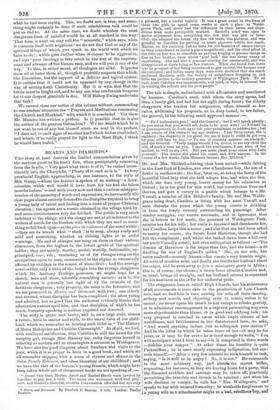BOOKS•
THE BISHOP OF ARGYLL'S PRESENT-DAY PAPERS.* OUR recent impressions of the work of the Scottish Episcopal Church have not been favourable. From that quarter proceeded some of the most childish extravagancies of the Church and the World, and a book which is full beyond anything in our experience of the most stupendous sophistries, Bishop Forbes' of Brechin's volume about the Thirty-Niue Articles. We welcome all the more heartily on this account Bishop Ewing's Present-Day Papers. It would be ungracious and, we are sure, unpleaaing to the author, were we to exalt him at the expense of the communion in which he bears rule. Nor should we wish to depreciate a Church which, whatever its errors and defects, has shown a sin- gular courage and devotion under poverty and suffering, and a touching devotion to a lost cause. But the help which such a theologian as Bishop Ewing, so genuinely liberal, and yet so wholly removed from anything irreverent and destructive, brings frbm this quarter to the good cause of true religious liberty, is a cause of unfeigned pleasure to all who love it.
We take it as an augury of good that the volume opens with a sketch, which we may presume to come from the editor's pen, of the life and character of William Law, author of the Serious Call. Law may well be a meeting- point for diverse schools of theology. He was a non-juror, and was thus connected with the divines from whom High Churchmen (not Romanizers, who have no spiritual ancestry what- ever in the English Church) derive the traditions of their theology. To the Evangelicals he commends himself by his recognition of facts which they conceive to be ignored or lightly regarded by High Churchmen and by liberal theologians,—the experiences of the spiritual life, what may be called the-phenomena of conver- sion. And lastly and chiefly, he is in accord with those whom, pace Mr. Maurice, we may call Broad Churchmen, in the basis on which his theological system rests, this basis, as Bishop Ewing expresses it, being,-
" That God is Love—from eternity to eternity Love—' abyssal' Love— an infinite fathomless depth of never-ceasing Love—ordering all His counsels, working all His works, regulating all events, governing all creatures according to the rules and measures of Love alone ; every sentiment antagonistic to Love being absolutely foreign to the Divine nature, and existing not in the Creator, but in the creature."
Of Law, however, though his treatise on the " Atonement" is in every respect suited for a " Present-Day Paper," we do not propose to speak, going on at once to see what Bishop Ewing has
• Present-Day Papers on Prominent Questions in Theology. Edited by the Right Rev. Alexander Ewing, D.C.L., Bishop of Argyll and the Isles. London: Strahan and Co. 1870.
to say of his own. To him, indeed, we may conjecturally attri- bute the three principal " papers," occupying, together with the long extracts which are embodied in•them, about three-fifths of the whole volume, and entitled "The Eucharist," "The Rule of Faith," and " The Present Unbelief." The essay on " The Eucharist" is a very able treatise, full of thought and acute and powerful reasoning, though it would have been the better foe more condensation and a less discursive method. Bishop Ewing, as it seems to us, goes to the root of the matter when he says :—
" The errors which have been rife amongst us on the subject of tho Eucharist have been of the very gravest kind, involving, in fact, the reality and character of Revelation. They raise the question whether, God, properly speaking, is the subject of Revelation, that is, a making of God known ; or whether we are merely in the presence of an instru- mentality, which, indeed, connects us with God, but in no sense by way of a true Revelation."
This last sentence, which we have ourselves italicized, is full of significance. Transubstantiation and all the kindred views of the " Real Presence," resting as they do on a certain theory of matter, now almost entirely banished from philosophical thought, as con- sisting of a certain substance and certain accidents, are essen- tially materialistic, however lofty the claims which they may make for themselves as exponents of a spiritual truth. The following is well put :—
" A conception which gives to matter the properties of spirit, and demands from matter spiritual results, reverses all the conditions by which knowledge is acquired, and upsets the basis whereon the know- ledge which we have is founded. Such a conception, too, by destroying natural order, puts an end to the possibility as well as the need of a Revelation. Accordingly we find that whore this conception is abso- lutely held, all intelligent use of Revelation ceases, and with the intelli- gence, moral goodness also. For in nations where this conception prevails, moral and intellectual truth having both become matters of uncertainty, spiritual debasement invariably follows. Where the Eucharist and the Incarnation become not the means whereby spiritual truth is manifested, but instrumentalities whereby spiritual truth is supposed to be produced by material causes, through a miraculous change wrought on matter, whereby it acquires tho nature and property of spirit, and operates on the spirit apart from the spiritual channels, miracle becoming the rule, all true knowledge and morality are put out of court."
And this, again :-
" Surely Christ did not come to set up His Body as the object of worship, or to present our flesh to us in a new and mysterious form ? His object surely was, as we have so often said, by taking our flesh to give us an understanding of spirit, that we might know God, who is true, in the only way He can be truly known, and by this to enthrone God in our hearts by manifesting Him as worthy of worship."
In writing of "The Present Unbelief," Bishop Ewing approaches a more difficult subject, in which many readers will probably find themselves less thoroughly in accord with him. He endeavours to trace the causes of the phenomenon, and finds them in what he calls the inadequate setting forth of the Christian faith, with which he believes the Church to be chargeable from the very earliest times, and which has given rise to particular exaggerations or mis- conceptions of Divine teaching, against which the reason and con- science of men have revolted. Chief among these misconceptions would come the scholastic theory of the Atonement, in which men are unable to recognize any real grappling with the difficulty which it professes to remove, anything better than an artificial arrangement by which something not really accomplished is taken as accom- plished; and the doctrine of Election, which attributes to the Divine Nature a caprice, cruelty, and injustice which human nature refuses to tolerate. That these are causes of unbelief iu the present day we do not doubt. When, as we read not long ago in a book noticed in these columns, of a Scotch minister explain- ing the Atonement to a half-witted lad by a dramatic scene, in which a man of particularly stern and forbidding aspect played the part of God the Father, and was about to pounce down with all the signs of fury upon his victim, when he was hindered by the interference of a gentler character, who represented the Son ; when, again, as we are told on the bishop's own authority that "a clergyman, having preached that there were many of the souls of little children now in hell, gave for a reason 'that God must have specimens of sinners of all ages,' " there must be a revulsion against the whole faith which is disfigured by representations so monstrous. And doubtless, an atheist lecturer would make capital out of such statements, would use them to leave an impression on his audience generally unfavourable, just as in another sphere of society a general
impression of unbelief is given, to %note an illustration from the volume before us, by the spectacle of a preacher coming down from a
pulpit in which he has been consigning ninety-nine hundredths of the human race, not to say of his own acquaintances and friends, to an eternity of torment, and then enjoying himself in society with a zest which he could not feel, did he really believe in the truth of what he had been saying. This, we doubt not, is true, and some- thing might certainly be done if such mischievous talk could be put an end to. At the same time, we doubt whether the most dangerous form of unbelief would be at all touched in this way. That form is what we may call the " scientific," which says, when it contents itself with negations we do not find God or any of the spiritual things of which you speak in the world with which we have to do ' ; which goes further when it choose to be aggressive, and says your theology is very much in the way of the improve- ment and advance of the human race, and we will put it out of the way.' To this, in either mood, all theologies are alike. It ignores them all or hates them all, though it probably respects that which, like Romanism, has the support of a definite and logical system. It is certain that it could not be appeased by any change in the way of setting forth Christianity. But it is with this that the battle must be fought out, and to any one who can furnish weapons for it our deepest gratitude is due. Will Bishop Ewing undertake that task?
We cannot close our notice of this volume without commending to our readers' attention the " Prayers and Meditations concerning the Church and Mankind," with which it is concluded. For these Mr. Maurice has written a preface. Is it possible that he is also the author of the prayers themselves ? We see words which he is not wont to use of any but himself when we read in the preface, " I dare not to omit signs of another kind which he has overlooked, and which, if he really prayed for light to the Most High, I think he would have hailed."































 Previous page
Previous page